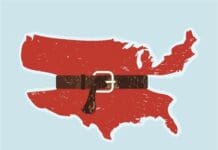New data from the Conference Board shows that consumer confidence in the United States fell to a new nine-month low in November, likely because of rising inflation and the ongoing COVID-19 pandemic. Consumer confidence likely fell as home, auto, and major appliance sales fell. Rising inflation and price increases as a result of shortages also likely deterred people from buying more high ticket items last month.
According to the Consumer Confidence Index completed by the Conference Board, the index fell to about 109.5. In October, the index was at 111.6.
However, even though consumer confidence has fallen to a new low for this year, analysts still expect to see strong economic growth for this fourth quarter as a whole. Already, many businesses and analysts are forecasted a strong holiday shopping season, even with this new data — and with the many problems that the country is facing.
Labor and material shortages continue to grip the nation. While hires have increased with each passing month, there is still a record number of job openings in the United States. Some material shortages have worked out, while others remain problematic. Meanwhile, the global supply chain problems still persist — and still impact the stock that businesses can grow during peak shopping seasons, such as the holiday season.
While consumer confidence has fallen, economists say that there is a slight relationship between spending and sentiment. This means that while consumer confidence has fallen, many analysts don’t believe that it will greatly impact how these consumers spend money, especially in the short run. If consumer confidence continues to fall, especially later on into the new year, then this may result in consumer confidence impacting spending in the long run.
For the most part, all signs point to a busy holiday shopping season. Because of the many problems the country is facing when it comes to the labor market and the supply chain, many analysts voiced their concern that consumers would have a hard time finding the gifts and goods they want to purchase, as many businesses have lower stock. As a result of this worrying, consumers started their shopping season early to ensure that they are able to purchase the items they want, before the stock runs out. Businesses have also worked overtime to ensure that they have enough stock by putting more money into their own supply chain.
Notably, this survey was completed before the Omicron variant of the coronavirus because publicly known. Therefore, this data is not affected by the Omicron variant in any way. With this said, the ongoing pandemic has likely tired consumers and affected how they spend their money, and on what items.
Analysts anticipate that the Omicron variant, if data continues to suggest that the variant is more contagious than the other variants, will disrupt the United States’ economic growth. How much the variant will slow down the country’s economic growth is debated, with some analysts saying it will only minimally impact the country, while others worry that it could moderately impact how consumers spend their money.













